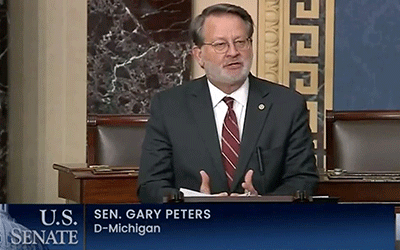
Michiganders urged to take precautions to prevent tick bites
Press Release FOR IMMEDIATE RELEASE: May 25, 2022 CONTACT: Chelsea Wuth, 517-241-2112, WuthC@michigan.gov Michiganders urged to take precautions to prevent tick bites LANSING, Mich. – The Michigan Department of Health and Human Services (MDHHS) is encouraging Michigan residents to take steps to avoid tick bites while enjoying the outdoors this summer. Tick-borne diseases, particularly Lyme disease and anaplasmosis, are increasing across the state. “Preventing tick bites is the best way to prevent tick-borne diseases, including Lyme disease and anaplasmosis,” said Dr. Natasha Bagdasarian, MDHHS chief medical executive. “If you find a tick attached to your body, promptly remove it. Monitor your health and if you experience fever, rash, muscle or joint aches or other symptoms, consult with your medical provider.” Lyme disease, caused by the bacterium Borrelia burgdorferi, is the most common tick-borne disease in Michigan. In 2021, there were 878 confirmed and probable reported cases of Lyme disease, nearly double the 451 cases reported in 2020. Anaplasmosis, caused by the bacteria Anaplasma phagocytophilum, is the second most common tick-borne disease in the state, and cases are also increasing. Reported cases of anaplasmosis in Michigan residents jumped from 17 confirmed and probable cases in 2020 to 56 in 2021. Counties with the largest increase in anaplasmosis cases include Dickinson and Menominee in the Upper Peninsula and Manistee and Benzie in the Lower Peninsula. Health care providers need to consider tick-borne diseases in people presenting with fever and other non-specific symptoms during the warm months when ticks are active. Both Lyme disease and anaplasmosis are transmitted by Ixodes scapularis, commonly known as the blacklegged or deer tick. The blacklegged tick is well-established in parts of Michigan’s Upper and Lower Peninsulas and has been found in new regions over the past few years. Information about Lyme disease risk by county is available at Michigan.gov/Lyme. Signs and symptoms of tick-borne disease typically begin one to two weeks after a tick bite or being in wooded or brushy areas where ticks commonly live. Early symptoms can be non-specific and include fever or chills, rash, headache, fatigue and muscle aches. Early treatment with appropriate antibiotics can decrease the risk of serious complications. Protect yourself and your family against tick-borne diseases by following these tips: Avoid tick-infested areas:
Use insect repellent:
Perform daily tick checks:
Bathe or shower:
Not all ticks spread the same germs. MDHHS can help to identify ticks you may encounter outdoors. Residents can email photos of ticks to MDHHS-Bugs@michigan.gov for identification. Michiganders can also submit ticks to MDHHS for identification free of charge. For more information on how to submit your tick and/or photos, visit Michigan.gov/Lyme. Visit CDC.gov/Ticks for additional information. |










